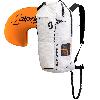Paolo Rabbia and his great Pyrenees winter ski traverse

 1 / 9
1 / 9 Paolo Rabbia
Paolo Rabbia
TRANSPIRENAICA by Paolo Rabbia
After 29 days alone one can only hope to have something to say: otherwise it means that things didn't turn out as planned. Personally, I'm not particularly inspired by things done by halves, like an uncompleted journey or a climb that doesn't reach the summit. I imagined my "adventure" on the watershed line that divides the things I know how to do - and which need a hint of uncertainty to become interesting - from those that are way too difficult - and which leads you to conclude that what counts isn't the summit but the path that leads you to it. At times this middle ground is so personal that, in cases like these, I have no other choice than to address them alone.
The traverse of the Pyrenees was far more lonely than that of the Alps five years ago. At the time - and in particular towards the end, as I approached my home mountains - I spent various days (circa a quarter) skiing with friends, both old and new. This time round though there was no one at all, except for a chance encounter with a friend and a section skied together with a Basque friend and alpinist: circa four hours in total. What's more: for me there is something familiar about the Alps in general, just knowing something about its history helps. While the Pyrenees, with many places named differently (in Catalan, Castilian, French, Basque), do everything to disorientate you. And if that doesn't suffice then there's the fog, the wind and those storms that blow in straight from the ocean, shedding loads of snow, making things immediately dangerous. Seeking advice from the locals is pointless: in the heart of winter very few know about these places on skis. Yet in the summer the Pyrenees are highly popular and trekkers and cyclists come from all corners of the globe to traverse from one sea to the other. The mountains certainly don't need to envy the Eastern Alps and it's no coincidence that the cream of the crop of Spanish alpinists, those who go on and achieve astounding feats in the Himalaya, stem from here.
Alone therefore, trusting my instinct and the desire to tire away. A desire that grew as days passed until it became superfluous, when a habit-driven man - as everyone is at home - found routine in all this, too. That's when days simplified, when things narrowed down to those four essential things - getting up, eating, setting off and trying to reach somewhere and snuggle up at night - that make you feel truly free. And, finally, they make you feel a little closer to nature that surrounds you.
It's difficult to plan something like things. How should you go about training to walk or ski ten, perhaps even 15 hours a day, one after the next, for 700km, and with a 20kg rucksack? For all my life I've done stamina sports - due to a lack of other talents - and from my teachers I've learnt that if you don't regularly top up the engine (with food and drink) then you won't get far. Having said that, I don't know why but when I embark on these undertakings I start the unhealthy habit of not eating or drinking much during the day: it's my way of delving into an experience which is mine only, one I know well and one which doesn't bother me. It goes without saying that during my rests I spend all my time eating and drinking without holding back, a map substituting the table cloth.
Even though I carefully studied the contour lines, made every effort to mark the altitudes and cardinal points on the map (with the priceless help of Bernini, who followed my progress via his computer at home), every day broke with a degree of uncertainty: would this be the right peak? Should something go wrong, would I be able to retrace my steps? Could I really cut across this slope?
Better to learn to live with this uncertainty sooner rather than later, face the inevitable. It was a bit like a lack of safety: since I was in the mountains, in such an overwhelming nature, why seek safety at all costs, and thus perhaps be caught unprepared for the unexpected, when this lack of safety could actaully act as a stimulant for all my senses, capable of keeping me alert and constantly on my toes? So never mind if I couldn't fully enjoy the scenery and if I had to take less photos. Less rigor, less certainties, more improvisation: the traverse akin to a jazz concert therefore.
The mountains - and nature in general - akin to a great classical music masterpiece: immutable despite the passing of time, always capable of inspiring, of moving. I came up here like a thief in a church, to grab something and race away; it's only afterwards, when I returned home and realisde I'd got away with it, that I thought perhaps I should also have stopped to say say a prayer.
Paolo Rabbia
The traverse took place from 22 January to 19 February, starting from Pic du Canigou by the Mediterranean sea and finished at de Pic Orhy on the Atlantic coast. These are the two extreme points of the massif, located above 2000 metres. Apart from being two symbolic mountains, in winter they mark the limit of what can be skied in the Pyrenees since the altitude then drops considerably and the proximity to the sea makes a ski traverse highly unlikely.
The kilometers I taveresed across- an estimate based on the time spent in some sections where the distance was known - were 700, with a max of 48km in a day, at altitudes between 900 and 2700 metres. The elevation gain was about 32,000 metres, 3,000 of which on foot, with skis strapped to my rucksack. Winter refuges weren't used, these were often unkempt and lacked firewood, sometimes stoves even, and I opted therefore to spend the nights at the (few) refuges that were open in winter or to the villages that were still inhabited. This resulted in more time spent traveling, on average 10 hours a day, with peaks up to 16. All of this without any kind of external support or supplies.
I used a carbon ski prototype, designed and manufactured entirely in the province of Cuneo, at Aski, Mondovì. Bindings: ATK. Boots: Scarpa F1. Skins: Geko without glue (one pair for the entire trip!). I mention these details because I think this type of raid is a test where you cannot bluff your way through with the equipment. The rucksack was modified so that I could transport gear with a headband (used, for example, by the Sherpa) and weighed 20kg at the start and 18 at the end once I'd finished all the energy foods and gas. I weighed 67 kg when I started, 64.5 kg when I finished. But I'm recovering quickly now thanks to my home cooking.



 Copia link
Copia link







 See all photos
See all photos





















